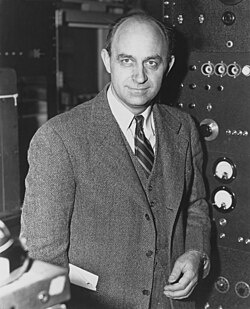
Enrico Fermi
Enrico Fermi (Italian pronunciation: [enˈriko ˈfermi]; 29 September 1901 – 28 November 1954) was an Italian-born, naturalized American physicist particularly known for his work on the development of the first nuclear reactor, Chicago Pile-1, and for his contributions to the development of quantum theory, nuclear and particle physics, and statistical mechanics. He was awarded the 1938 Nobel Prize in Physics for his work on induced radioactivity.
Fermi is widely regarded as one of the leading scientists of the 20th century, highly accomplished in both theory and experiment. Along with J. Robert Oppenheimer, he is frequently referred to as "the father of the atomic bomb". He also held several patents related to the use of nuclear power.
Several awards, concepts, and institutions are named after Fermi, such as the Enrico Fermi Award, the Enrico Fermi Institute, the Fermi National Accelerator Laboratory, the Fermi Gamma-ray Space Telescope, the Enrico Fermi Nuclear Generating Station, a class of particles called fermions, the synthetic element fermium, and many more.
In 1938, Fermi received the Nobel Prize in Physics at the age of 37 for his "demonstrations of the existence of new radioactive elements produced by neutron irradiation, and for his related discovery of nuclear reactions brought about by slow neutrons". After Fermi received the Nobel Prize in Stockholm, he, his wife Laura, and their children emigrated to New York. This was mainly because of the Manifesto of Race promulgated by the fascist regime of Benito Mussolini in order to bring Italian Fascism ideologically closer to German Nazism.
The new laws threatened Laura, who was Jewish. Also, the new laws put most of Fermi's research assistants out of work. Soon after his arrival in New York, Fermi began working at Columbia University, where he had already given summer lectures in 1936 (preface to Thermodinamics, Dover Publications, Inc. NY).
Enrico Fermi had been the first to use a neutron to produce the radioactive change of one element to another. On 2 December 1942 he initiated the atomic age with the first self-sustaining chain reaction, after which he became known as "father of the atomic bomb". Michael H. Hart ranked him No. 76 in his list of the most influential figures in history.
No comments:
Post a Comment